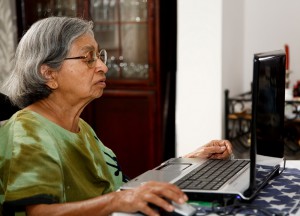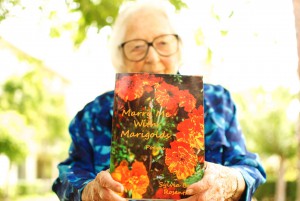Share This
Related Posts
Tags
Empowering Seniors
By Erica Rascón on Oct 12, 2015 in News
 Senior communities are breaking through the stereotypes that once defined them. In place of one-size-fits-all complexes, the industry trends towards niche markets. Bygone are the days of scheduled meals and weekly bingo—well, bingo isn’t going anywhere–but freestyle dining is the new standard. Instead of quiet evenings around the television, modern senior housing hones in on fresh opportunities that enrich residents’ lives. These activities empower seniors, allowing them to experience the health-boosting benefits of personal fulfillment and a sense of purpose.
Senior communities are breaking through the stereotypes that once defined them. In place of one-size-fits-all complexes, the industry trends towards niche markets. Bygone are the days of scheduled meals and weekly bingo—well, bingo isn’t going anywhere–but freestyle dining is the new standard. Instead of quiet evenings around the television, modern senior housing hones in on fresh opportunities that enrich residents’ lives. These activities empower seniors, allowing them to experience the health-boosting benefits of personal fulfillment and a sense of purpose.
One method of empowerment comes through lifelong learning programs. These programs take the form of non-credit academic courses, volunteer work, or educational travel. Each promotes mental, physical, and social well-being for residents.
In her book Learning Later, Living Greater: The Secret for Making the Most of Your After-50 Years, expert Nancy Merz Nordstrom details the benefits of lifelong learning programs. Among the benefits, education furnishes seniors with a sense of self-fulfillment and purpose—both of which contribute to improved mood and outlook for seniors.
“We’re out and about,” says Nordstrom. “We’re taking part in educational programs, traveling all over the world, and offering our expertise to society through meaningful community involvement. We’re not a strain on society; we’re an incredible asset.”
Education also helps seniors develop new skills that will accompany them as they face personal and social change. “Lifelong learning enables us to keep up with society’s changes – especially the technological ones. A learning environment with our peers not only makes it possible to stay abreast of change, it also makes it fun.”
The Lifelong Living program at Lasell Village emphasizes the benefits of mental stimulation for residents’ wellbeing. Residents must participate in 450 hours of learning or fitness activities each calendar year. They can determine the atmosphere in which they feel the most comfortable: an inter-generational class at a local college, a seniors-only class onsite, the local library, or an onsite studio. Development opportunities include teaching or participating in classes, mentorship programs, community service, travel, independent research, employment, and physical activity.
Primarily, Lifelong Living influences participant well-being by facilitating a change in perspective. Rather than fixating on health issues and physical limitations, residents are encouraged to explore new possibilities, insights, and skills. The classes promote neuroplasticity, resulting in residents who can stay mentally healthy, longer.
Though most seniors will not embark on a new career after taking classes, it is not entirely out of the question. Sylvia Berek Rosenthal is a resident at Oakmont of Montecito, a Yardi client.

Image of Sylvia Berek Rosenthal by photographer Katie Olson
At the age of 75, she took a class on writing poetry that changed her life. “I started with an undergraduate class,” Rosenthal begins. “[The students] were absolutely wonderful, welcoming and warm. We were interested in the same thing. It had nothing to do with age. It was all about what we were doing.”
One class lead to another. After several classes, Rosenthal built the confidence needed to participate in a poetry contest. She won.
“It felt so nice for an old lady to win with a love poem,” she chuckles in an interview about the contest. That success led to the publication of two books. Her most recent publication, Marry Me with Marigolds, was released this year shortly before her 92nd birthday.
When asked for advice to offer to other seniors on the brink of new career path, she laughs. “Well, you know, follow your dreams. It’s very trite,” she admits, “But do it. Just get in there and start! No matter how weird it seems.”
Rosenthal now uses her talent to uplift the Oakmont of Montecito community every Valentine’s Day. “Every year since I’ve been here, I do a Valentine’s Day program. How can you not do poetry on Valentine’s Day? You’ve got to do a Shakespearian sonnet, some old things, some new things. I also ask people to bring a piece of their own poetry. I will read it if they don’t want to.” The program gives other residents the opportunity to hone their communication skills.
Lifelong Learning poses one viable option for resident wellbeing. Another option comes by reimagining the family structure. At Mi Casa community in Washington, D.C, seniors form part of a symbiotic community with young mothers. All community members complete 100 hours of volunteer work every quarter: the young parents assist seniors by running errands, providing transportation, and helping out with home projects. In return, seniors assist with childcare as the parents work or finish school.
Seniors benefit from these creative family structures. Research by Generations United reveals that seniors who are enrolled in childcare programs display better emotional and mental health indicators, experience improved socialization, and take pride in their community engagement.
The trend of mutually supportive communities continues to gain momentum. There are nearly 1,000 inter-generational care facilities in the U.S. Half a dozen communities modeled after Mi Casa are in development. Seniors have the opportunity to volunteer with children, veterans, and the disabled. Each unique community furnishes seniors with singular cognitive benefits.
There are several ways to empower seniors throughout their golden years. The range of possibilities spans revenues, locations, and time commitments. What remains steady is the sense of fulfillment, purpose, and joy that empowerment activities can bring to seniors’ lives.
